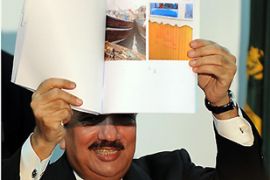Pakistan admits Mumbai attack link
Criminal case opened against eight people over deadly raid on India’s financial capital.

Malik said that police had traced to Pakistan a boat engine used by the attackers, and infiltrated two hideouts of the suspected attackers in the country.
His statements came after two months of rising tensions between India and Pakistan over the Mumbai raids.
Laskhar in focus
India has blamed the attacks on the banned Pakistan-based group Lashkar-e-Taiba.
The Lashkar says it is fighting against New Delhi’s rule over Indian Kashmir.
Islamabad has been under pressure from India and major world powers to crack down on the Lashkar.
| In depth |
|
Global outrage over attacks Media reacts to Mumbai mayhem Pakistan-India relations in focus |
Pervez Musharraf, the former president of Pakistan, banned the Lashkar in January 2002.
New Delhi says all 10 armed men involved in the Mumbai attack were Pakistanis.
It also says that the men’s handlers in Pakistan had kept up communication by phone during the three-day assault on luxury hotels, a railway station and a Jewish community centre.
Al Jazeera’s correspondent Kamal Hyder said Pakistan has put 30 questions to India and asked for DNA samples of Mohammad Ajmal Kasab, the sole Mumbai attack suspect caught alive by Indian officials.
“They want Kasab to be brought to Pakistan for a trial, although there is no extradition treaty between the two countries,” he said.
Pakistan maintains there are other links to its investigation, including telephone communications from Russia, Bangladesh and Spain, Hyder said.
Pakistan denied any responsibility in the immediate aftermath of the attacks, but later admitted that Kasab was one of its citizens.
Indian reaction
India has consistently accused Pakistan of not doing enough to arrest those responsible for the Mumbai attack.
But New Delhi welcomed Islamabad’s admission on Thursday, while saying that the country must now dismantle the “infrastructure of terrorism” on its soil.
“This is a positive development,” an Indian foreign ministry statement said.
 |
| At least 179 people were killed in November’s co-ordinated attacks in Mumbai [AFP] |
“We would also expect that the government of Pakistan take credible steps to dismantle the infrastructure of terrorism in Pakistan.”
Imtiaz Gul, a political analyst based in Pakistan, told Al Jazeera that Islamabad’s decision to register a criminal case against the suspects is not enough to satisfy New Delhi.
“The kind of noises and demands we have been hearing from across the border have been asking for much more,” he said.
“But Pakistan has very tactfully and successfully turned the things around. The single focus that India was proceeding with in an effort to put the entire blame on Pakistan, and perhaps implicate some state institutions such as the ISI … I think that has been turned around.”
The ISI, or Inter Services Intelligence, is Pakistan’s spy agency.
Gul said Malik has successfully conveyed the message that organisations such as the Lashkar are not restricted to India and Pakistan only, “that they transcend all borders, and that is why they found leads in a number of countries including Italy, Spain and the Middle East”.
Holbrooke visit
Speaking from Lahore, Ahmed Rashid, journalist and author of books on the Taliban, told Al Jazeera that Pakistan’s findings have come as a surprise.
|
“[Richard] Holbrooke will now at least have reason to urge the Indians to possibly try to reopen some of the stalled negotiations” Ahmed Rashid, |
“The fear for many people [in Pakistan] was that the authorities would sidestep the real issue of implication of militant groups in Pakistan, but thankfully that has not happened,” he said.
“This has come at a very strategic time … Holbrooke is in Kabul, he was in Pakistan and will be in Delhi in two days’ time.
“He will now at least have reason to urge the Indians to possibly try to reopen some of the stalled negotiations since the Mumbai massacre.”
Rashid was referring to Richard Holbrooke, the US special envoy to Afghanistan and Pakistan, currently touring the region.
“Holbrooke’s trip is very important,” Rashid said. “It was also very important that the Pakistani military and the government set off on a good footing with Holbrooke … and I think they are trying to do that.”
